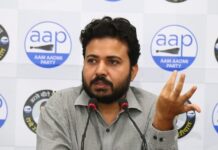Jayanand Bharati became a legend life long but his life is not taught in our schools and colleges. The historians as usual ignored him perhaps because of his castes though his acceptability among the savarnas too was big. Arya Samaj has a big influence on the Shilpkar community of Uttarakhand. Shilpkar is a term basically now officially used for the Dalits in Uttarakhand. It is a beautiful name which means artisans or builders. It reflect the creativity of the community. Late Hari Prasad Tamta, another legend from Uttarakhand who stood with Dr Ambedkar during the round table conference in 1932 on the question of separate settlements for the Untouchables. The difference between Jayanand Bharati and Hari Prasad Tamta was that they struggled and both became legends in their own way. One dedicated his life for the nation, became an Arya Samaji and brought community into it. That is why a large number of Shilpkar’s particularly in Garhwal used the sirname Arya which means they are superior. The Sanskritisation process here was strong and all those who became Arya Samajis actually started wearing ‘Janeu’ and reading Vaidik Mantras. Hari Prashad Tamta however differ with it as he felt that the real threat to the Shilpkar community is from religion only as the caste system is still functioning and acceptability of the Shilpkar’s even when they embraced Arya Samaj would not be that much. But we must also give credit to Arya Samaj for giving them the alternative even if it was with in the parameters of ‘social reforms’. Fact is from Punjab to Western Uttar Pradesh, Arya Samaj influenced. As a philosophy, I never agreed with it. Even I felt today’s Arya Samajis have become more than casteist than the common brahmanical elite. However, Uttarakhand Shilpkar have grown and at least saved them from multiple religious rituals after embracing Arya Samaj. A lot of expenses in ugly rituals including marriages, death and birth ceremonies were thus reduced which helped them. Today, the community is quite successful but politically not assertive in the state.
Yesterday, when we were celebrating the historical day of September 6th when in 1932 the heroism of Karmvir Jayanand Bharati got reflected as he refused to accept the arrival of Michel Halley, the then governor of British Garhwal. The British with the help of some local people had created Aman Sabha’s suggesting that the Pahadis have welcomed them with open arms but Jayanand Bharati would not them go. So he waved the Congress flag that time. Now, many suggest it was not the congress flag but black flag. However, none doubt that there was a protest and Jayanand Bharati was arrested and prosecuted later on.
But the biggest fight that Jayanand Bharati led in the Uttarakhand was against the Dola palki system. In those days between 1923 to 1941 this civil liberties movement in the hills became voice of the untouchables. In the earlier time, the Dola and Palki were particularly used to carry bride and grooms of the of the erstwhile Rajas later it became part of the common people too for their children during the marriage due to tough tarrain in the hills and impossibility of the other medium of transportation. The people would carry both the bride and grooms in them. Very unfortunately the caste Hindus did not allow the same to the Shilpkar to carry their bride and grooms during the wedding ceremony. A particular marriage on February 2nd 1929 could only got completed by 19 days later on February 21st, 1929 as the Savaranas did not allow the ‘barat’, the marriage party to leave. On February 21st, 1936 Allahabad High Court outlawed this practice yet the practice continued. Many Shilpkar’s threatened to convert to Christianity and gave a call but the Arya Samajis pursued them not to do so yet some of them did convert. Ultimately this cruel and uncivilised system got completely out from the hills in that period only and if the man who was responsible to bring this huge change was Jayanand Bharati.
It is important to understand that Jayanand Bharati was a Gandhian and working through persuasions. He succeeded on many things but Gandhian methods have rarely helped the Dalits in the longer terms and reason for it is the deeply patronising attitude in it. Gandhi might have given it a thought in the Congress party but it left the Dalitothan to the Savarnas who are still not ready to learn and accept that all people are born equal.
Yesterday, when we had our rallies, the Shilpkar community leaders were very mild in raising slogans. It just revolve around jai ho, Uttarakhandi kaisa ho, jayanand bharati jaisa ho. Contrary to this was an absolutely mindless march of the students of the inter colleges or even High school students saying ‘ Kala Kanoon wapas lo’, a reference to SC-ST act. We know these young minds were being used for political purposes as elections are approaching. These children did not know that they are opposing a law which is to give justice to people, duly passed by parliament and now part of our constitution. If powerful communities are made to believe that all laws meant for social justice and human rights violate rights of certain people then we are in a very dangerous age now but Savarnas have converted this debate into a new gutter level discourse which is sad.
When we remember Jayanand Bharati, it is important not to judge him through today’s time but the prevailing situation that time. He grew up in a religious family. His father was a Jagari, a particular caste which recite special mantras ( they are not mantras as mantras can only be recited by the brahmins to please gods but if the dalit recite them it become Jagars) but remember these Jagars are not merely part of Dalit culture but inclusive to all. One of the greatest exponent of Jagar art was late Chandra Singh Rahi whose songs are still available on youtube. Jagar is a perfect art even it is superstition but the art of singing is unique to Uttarakhand.
The demands to erect statues, roads, universities, colleges and cities or award of national importance is usual to say the least. It is important for the government to listen to these and honor them but more than that the lives and times of these people must be part of our basic school textbooks so that children can understand that India today is not merely the contribution of a few savarna leaders but huge numbers of Dalit Adivasis Bahujans who worked silently and did not get time to be included in ‘official’ list.
I would also request social movements not to hand over the politicians as they would only use it for their purposes. Only those politicians, if you still want to invite them, who have an impeccable track record of standing with the Dalits or speaking for social justice. Those who know at least bit of Dalit movement and Dr Baba Saheb Ambedkar.
I support all this that these freedom fighters who did not have the luxury of the savarna surnames must get their honor but my ultimate request to those who follow the ‘leaders’ is that the path to liberation of slave minds and it include all who mindlessly follow religions of different variety is through readings and understanding of Dr Ambedkar. Educate your children in enlightened Ambedkarite thoughts and you will see the change. On Jayanand Bharati’s heroic day, I salute him but my request to all friends in Uttarakhand to spread the words of Dr Ambedkar in each home and light will automatically brighten their lives soon.
Vidya Bhushan Rawat
September 7th, 2018









